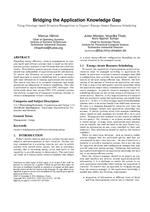LATPub568: Unterschied zwischen den Versionen
Aus International Center for Computational Logic
Marcel Lippmann (Diskussion | Beiträge) KKeine Bearbeitungszusammenfassung |
Markus Krötzsch (Diskussion | Beiträge) K (Textersetzung - „|Projekt=HAEC |“ durch „|Projekt=HAEC B02 |“) |
||
| (4 dazwischenliegende Versionen von 2 Benutzern werden nicht angezeigt) | |||
| Zeile 7: | Zeile 7: | ||
|Referiert=1 | |Referiert=1 | ||
|Title=Bridging the Application Knowledge Gap | |Title=Bridging the Application Knowledge Gap | ||
|To appear=0 | |||
|Year=2014 | |Year=2014 | ||
|Month= | |Month=Dezember | ||
|Booktitle=Workshop on Adaptive and Reflective Middleware'14 | |Booktitle=Workshop on Adaptive and Reflective Middleware'14 | ||
|Organization= | |Organization= | ||
}} | }} | ||
{{Publikation Details | {{Publikation Details | ||
|Abstract=Regarding energy efficiency, resource management in complex hard- and software systems that is based on the information typically available to the OS alone does not yield best results. | |Abstract=Regarding energy efficiency, resource management in complex hard- and software systems that is based on the information typically available to the OS alone does not yield best results. Nevertheless, general-purpose resource management should stay independent of application-specific information. To resolve this dilemma, we propose a generic, ontology-based approach to resource scheduling that is context-aware and takes information of running applications into account. The central task here is to recognize situations that might necessitate an adaptation of resource scheduling. This task is performed by logical reasoning over OWL ontologies. | ||
Nevertheless, general-purpose resource management should stay independent of application-specific information. To resolve this dilemma, we propose a generic, ontology-based approach to resource scheduling that is context-aware and takes information of running applications into account. | |||
Our initial study shows that current OWL 2 EL reasoner systems can perform recognition of exemplary situations relevant to resource management within 4 seconds. | Our initial study shows that current OWL 2 EL reasoner systems can perform recognition of exemplary situations relevant to resource management within 4 seconds. | ||
|Download=HaMeTT-ARM-14.pdf | |Download=HaMeTT-ARM-14.pdf | ||
|Projekt=HAEC B02 | |||
|Projekt= | |||
|Forschungsgruppe=Automatentheorie | |Forschungsgruppe=Automatentheorie | ||
|BibTex=@inproceedings{ HaMeTT-ARM-14, | |BibTex=@inproceedings{ HaMeTT-ARM-14, | ||
| Zeile 41: | Zeile 27: | ||
year = {2014}, | year = {2014}, | ||
} | } | ||
}} | }} | ||
Aktuelle Version vom 22. März 2016, 16:31 Uhr
Bridging the Application Knowledge Gap
Marcus HähnelMarcus Hähnel, Julian MendezJulian Mendez, Veronika ThostVeronika Thost, Anni-Yasmin TurhanAnni-Yasmin Turhan
Marcus Hähnel, Julian Mendez, Veronika Thost, Anni-Yasmin Turhan
Bridging the Application Knowledge Gap
Workshop on Adaptive and Reflective Middleware'14, December 2014
Bridging the Application Knowledge Gap
Workshop on Adaptive and Reflective Middleware'14, December 2014
- KurzfassungAbstract
Regarding energy efficiency, resource management in complex hard- and software systems that is based on the information typically available to the OS alone does not yield best results. Nevertheless, general-purpose resource management should stay independent of application-specific information. To resolve this dilemma, we propose a generic, ontology-based approach to resource scheduling that is context-aware and takes information of running applications into account. The central task here is to recognize situations that might necessitate an adaptation of resource scheduling. This task is performed by logical reasoning over OWL ontologies. Our initial study shows that current OWL 2 EL reasoner systems can perform recognition of exemplary situations relevant to resource management within 4 seconds. - Projekt:Project: HAEC B02
- Forschungsgruppe:Research Group: AutomatentheorieAutomata Theory
@inproceedings{ HaMeTT-ARM-14,
address = {Bordeaux, France},
author = {Marcus {H\"ahnel} and Julian {Mendez} and Veronika {Thost} and Anni-Yasmin {Turhan}},
booktitle = {Workshop on Adaptive and Reflective Middleware'14},
month = {December},
title = {Bridging the Application Knowledge Gap},
year = {2014},
}
